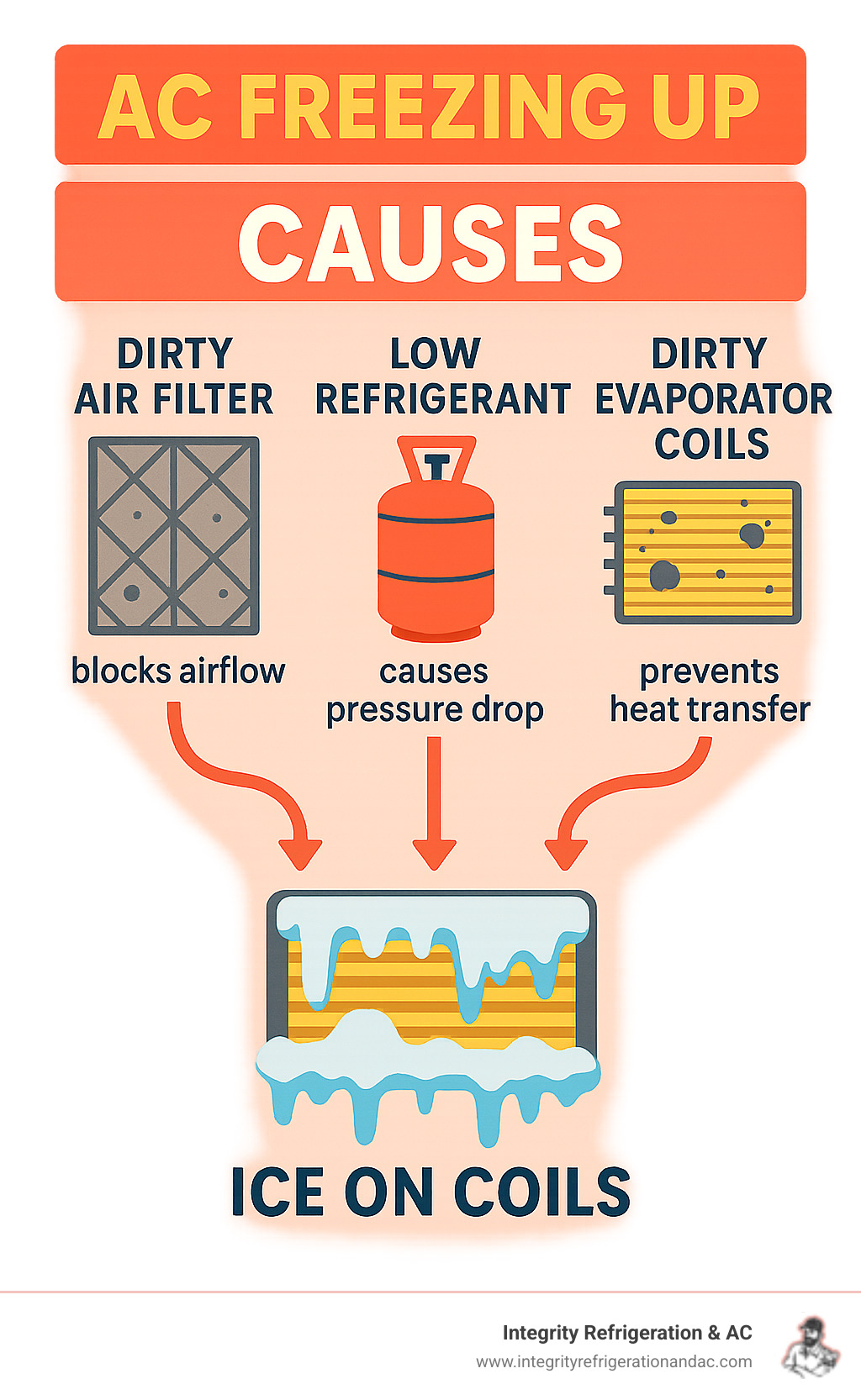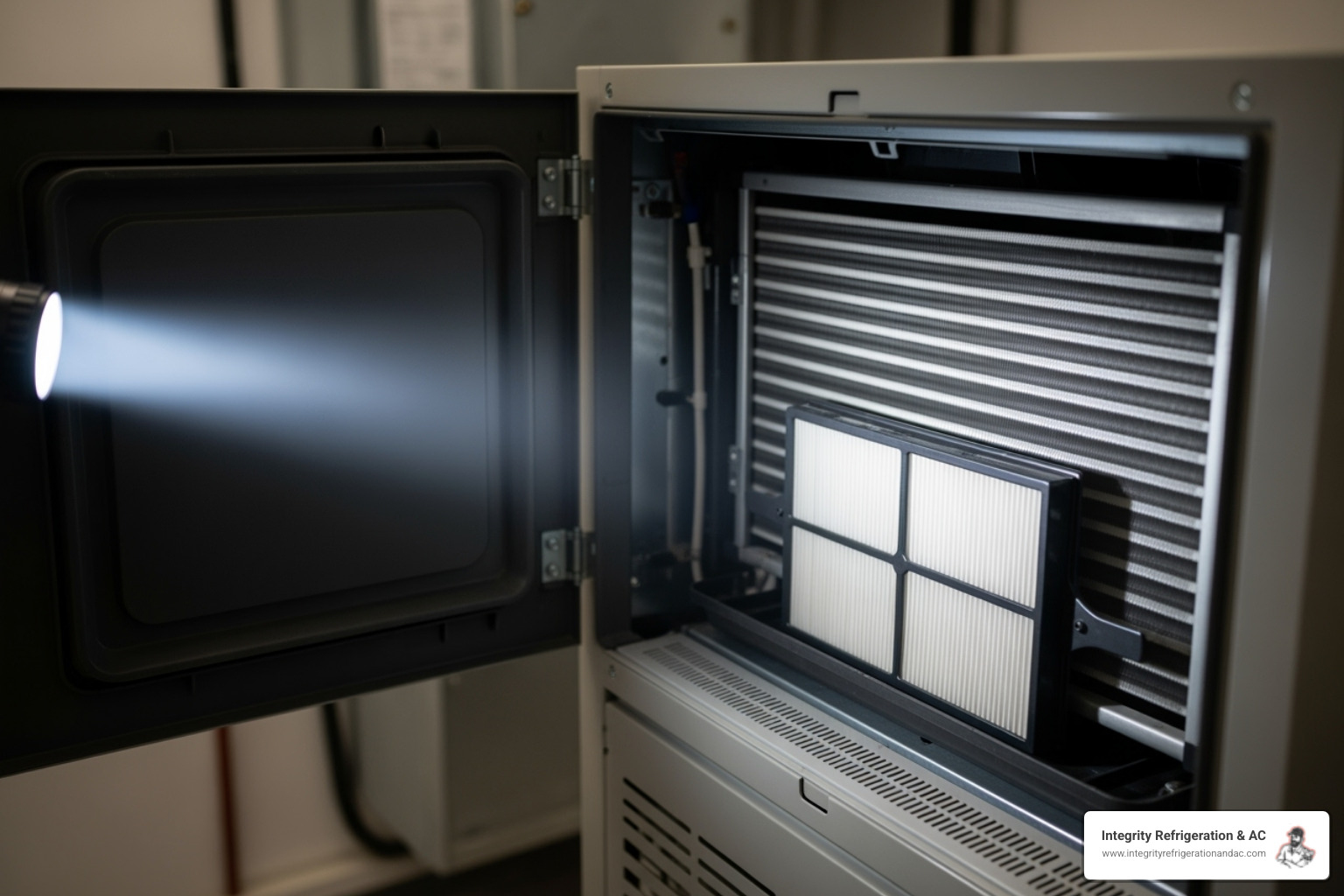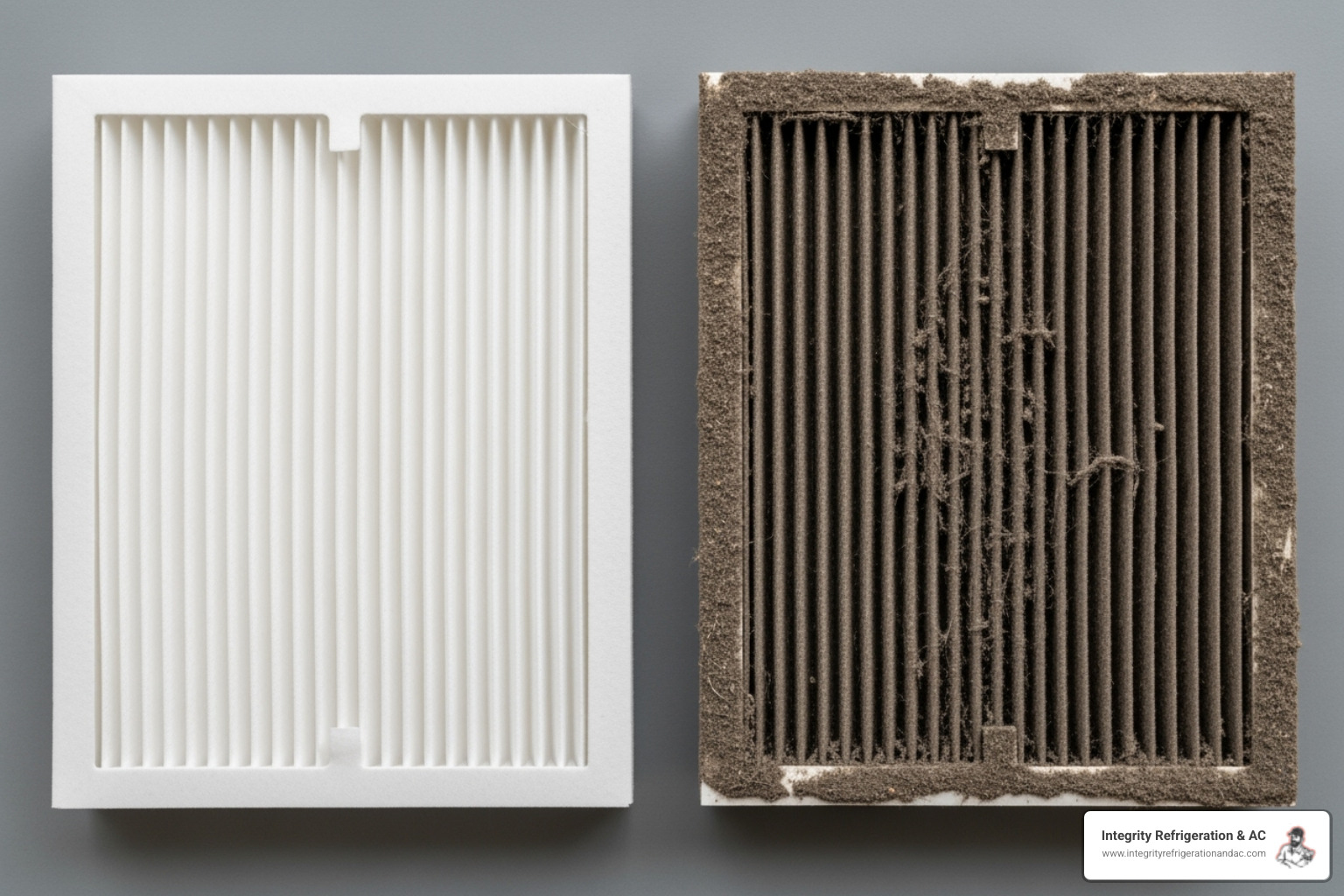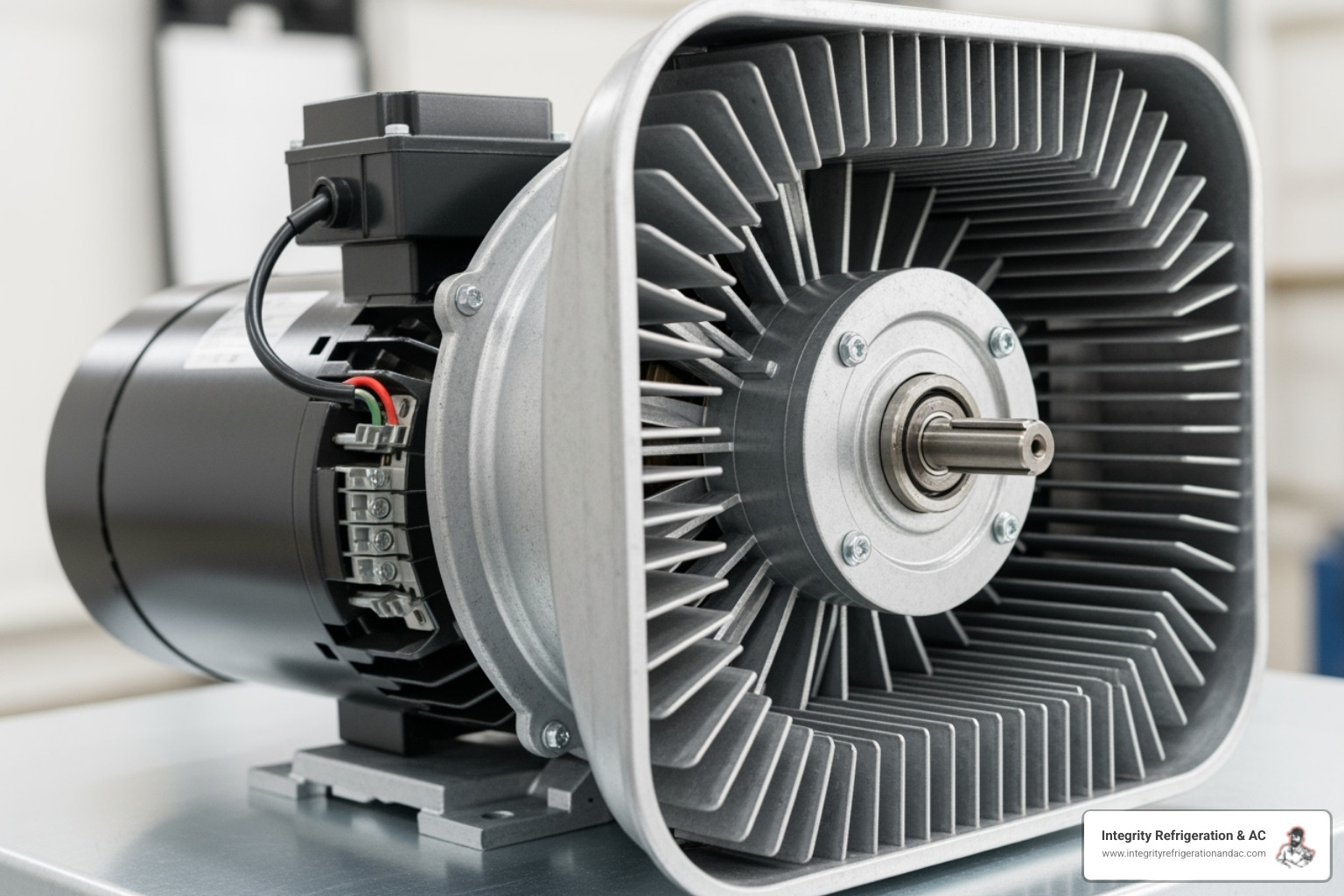AC Freezing Solid? Causes and Safest Defrost Methods


AC Freezing Solid? Causes and Safest Defrost Methods

When Ice Forms Where It Shouldn't: Understanding Frozen AC Units
AC freezing up is one of the most common yet alarming problems Florida homeowners face during hot summer months. When your air conditioner turns into an ice-covered block, it's not just failing to cool your home - it's actively working against you.
Quick Answer: What Causes AC Freezing Up?
- Restricted Airflow - Dirty air filters, blocked vents, or dirty evaporator coils prevent warm air from flowing over the cold coils
- Low Refrigerant Levels - Leaks cause pressure drops that make coils extremely cold, forming ice
- Malfunctioning Blower Fan - Reduced air circulation allows coils to get too cold
- Running AC Below 60°F - Low outdoor temperatures can disrupt normal operation
The irony is striking: your cooling system literally freezes when you need it most. As one HVAC expert noted, "Little is more troubling than seeing ice on the air conditioning system in your home" during Florida's sweltering heat.
Why This Happens
Your AC works by absorbing heat from indoor air through cold evaporator coils. When something disrupts this heat exchange - whether it's blocked airflow from a dirty filter or low refrigerant from a leak - those coils become too cold. Add Florida's humidity to the mix, and ice forms rapidly.
The consequences go beyond discomfort. A frozen AC can damage your compressor (potentially costing thousands), cause water damage as ice melts, and spike your energy bills as the system works harder while cooling less.

What to Do Immediately When Your AC Freezes
When you find your AC unit looking like it belongs in a winter wonderland rather than sunny Florida, your first instinct might be to panic. Take a deep breath! While AC freezing up is definitely a problem that needs immediate attention, the right steps can prevent what could become a very expensive disaster.
The key word here is immediate. Every minute your frozen AC continues running, you're potentially causing more damage to your system. Think of it like driving a car with the engine overheating - the longer you ignore it, the bigger the repair bill becomes.
The Dangers of Ignoring a Frozen AC
Here's the hard truth: a frozen AC isn't just an inconvenience that will magically fix itself. It's your system crying out for help, and ignoring those cries can lead to some seriously painful consequences.
System failure tops the list of nightmares. When ice builds up on your evaporator coils, your compressor - basically the heart of your AC - has to work overtime pumping liquid refrigerant instead of gas. Compressors aren't designed for this, and they don't handle it well. Compressor burnout can mean replacing the most expensive part of your entire system.
But the damage doesn't stop there. As that ice melts (and it will), you're looking at potential water damage throughout your home. Overflowing drain pans can lead to ceiling stains, warped floors, and even mold growth - especially problematic in Florida's humid climate.
Your wallet feels the pain too. A frozen system works harder while cooling less, leading to those dreaded AC is Causing High Electric Bills. And if refrigerant leaks develop from the stress? That's another repair headache entirely. Understanding How to Address AC Refrigerant Leaks becomes crucial for both your comfort and your budget.
How to Safely Thaw the Ice
The good news? Safely thawing your frozen AC is actually pretty straightforward. The bad news? It requires something many of us struggle with - patience.
Turn off the cooling immediately. Switch your thermostat from "Cool" to "Off" right now. This stops the compressor from making things worse. Think of it as stopping the bleeding before you bandage the wound.
Next, turn on just the blower fan by switching the fan setting from "Auto" to "On." This circulates warm indoor air over those frozen coils, helping speed up the natural melting process. It's like using a hair dryer on low heat instead of trying to chip away ice with a hammer.
While you're waiting, check your air filter. A dirty, clogged filter is often the villain behind restricted airflow that causes freezing in the first place. If it looks like it's been through a dust storm, replace it.
Now comes the hard part: allow natural melting. Depending on how much ice built up, this can take anywhere from a few hours to a full day. Resist the urge to speed things up with hot water, hair dryers, or ice picks. These "helpful" shortcuts usually end up damaging delicate coils and fins, turning a manageable problem into an expensive repair.
Place some towels around your indoor unit to catch melting water. Once everything is completely dry and ice-free, you can switch back to normal operation. Keep a close eye on your system for the next few hours - if it starts freezing again, you've got a deeper issue that needs professional attention.
Proper airflow is crucial for preventing future freeze-ups. Our guide on Fixing AC Airflow Problems can help you understand what to watch for going forward.
Why Is My AC Freezing Up? Uncovering the Common Causes

Picture your AC as a perfectly choreographed dance between heat and cold. When this delicate performance gets disrupted, your cooling system can literally freeze up on you. The science behind AC freezing up is actually pretty straightforward: your evaporator coils need warm indoor air flowing over them to absorb heat. When something blocks this process, those coils get too cold and ice starts forming.
Think of it like this - your AC coils are like a cold drink on a humid day. Under normal conditions, moisture condenses and drains away. But when the coils get too cold because they can't absorb enough heat, that moisture turns into ice instead.
Most frozen AC unit problems we see fall into three main categories: airflow problems, refrigerant issues, and mechanical failures. The good news? Once you understand what's happening, many of these issues become much easier to prevent. Let's explore the most common culprits behind Common AC Problems and Their Solutions.
Blocked Airflow from a Dirty Filter or Coils
Here's the number one reason we get calls about AC freezing up - and it's often the easiest to fix! Your AC is like a respiratory system that needs to "breathe" properly. When airflow gets restricted, those evaporator coils can't absorb enough heat from your indoor air, causing them to drop below freezing temperatures.
Dirty air filters are the biggest troublemaker here. When your filter gets clogged with dust, pet hair, and debris, it's like trying to breathe through a thick blanket. Your AC simply can't pull enough warm air through to keep those coils from getting too cold. Industry experts tell us that just keeping your filter clean can improve your system's efficiency by 5% to 15% - that's real money in your pocket!

But sometimes even a clean filter isn't enough. Dirty evaporator coils can develop their own layer of grime over time, acting like a winter coat that prevents proper heat transfer. This buildup makes it nearly impossible for the coils to absorb heat efficiently, leading to the same freezing problem. If you're dealing with coil issues, our guide on what to do when your AC Evaporator Coil Might Be Leaking can help you understand the warning signs.
Don't forget about blocked vents either. We've seen homeowners accidentally block return vents with furniture or close off supply registers in unused rooms, thinking they're saving energy. Unfortunately, this disrupts your system's carefully balanced airflow and can contribute to freezing issues.
Low Refrigerant Levels
Here's something that surprises many homeowners: your AC should never run low on refrigerant under normal circumstances. It's a closed-loop system, meaning the refrigerant should last the lifetime of your unit. If levels are low, you've got a refrigerant leak somewhere in the system.
When refrigerant leaks out, the pressure in your system drops significantly. This pressure drop causes the remaining refrigerant to expand and become extremely cold through something called the Joule-Thomson effect - basically, when gas expands rapidly, it gets much colder. The result? Your evaporator coils become so cold that ice forms quickly, even with normal airflow.
One telltale sign of a refrigerant leak is a hissing sound coming from your unit. If you're hearing unusual noises, check out our article on Why Your AC is Making Hissing Sounds to understand what your system might be telling you.
A Malfunctioning Blower Fan
Your blower fan is the unsung hero of your AC system - it's responsible for moving air across those crucial evaporator coils. When this fan isn't doing its job properly, freezing problems are almost inevitable.

Blower motor failure is more common than you might think, especially in older systems. Most blower motors last about 10-12 years, so age can definitely be a factor. When the motor starts failing, you'll notice weaker airflow from your vents, and without sufficient air movement over the coils, freezing becomes almost certain.
Sometimes the motor isn't completely broken - it might just be running at the incorrect fan speed. This can happen due to electrical issues or incorrect settings, but the result is the same: insufficient airflow leads to frozen coils.
If you're experiencing any fan-related issues, whether it's AC Fan Motor is Overheating or other problems, our comprehensive guide to Solve Your AC Fan Issues can help you understand when it's time to call in the professionals.
How to Prevent Your AC from Freezing in the Future
Nobody wants to deal with AC freezing up when Florida's summer heat is at its peak! The good news is that most frozen AC problems are completely preventable with a little proactive care. Think of it like brushing your teeth - a few minutes of regular attention saves you from major problems down the road.
Prevention is always cheaper than repair, and it's definitely less stressful than finding your AC has turned into an ice block on the hottest day of the year. By staying ahead of potential issues, you'll enjoy consistent comfort while keeping your energy bills in check. For additional ways to keep your system running efficiently, our guide on AC Services in Winter Haven: 10 Energy Saving Tips for AC Owners offers valuable insights.
The Importance of Regular HVAC Maintenance
Professional maintenance is like giving your AC a annual physical exam - it catches problems before they become emergencies. Just as you wouldn't skip your car's oil changes, your AC needs regular professional attention to prevent AC freezing up and other costly issues.
Our AC Maintenance Winter Haven, FL service focuses on the key areas that prevent freezing problems. During a professional tune-up, our certified technicians tackle the root causes we discussed earlier.
Cleaning coils is one of the most important steps. Over time, both your indoor evaporator coils and outdoor condenser coils collect dirt, dust, and debris that acts like a blanket, preventing proper heat transfer. When we remove this buildup, your system can breathe again and maintain proper temperatures.
Checking refrigerant levels requires specialized equipment and training. Our technicians use precise gauges to measure system pressure and identify any leaks before they cause freezing. If we find a leak, we can repair it and restore proper refrigerant levels, preventing the dangerous low-pressure conditions that lead to ice formation.
Inspecting components means we examine your blower motor, electrical connections, and other critical parts for signs of wear or malfunction. A failing blower motor might work fine most of the time but struggle during peak demand, leading to reduced airflow and potential freezing.
Regular maintenance also ensures proper airflow throughout your entire system. We can spot issues like partially collapsed ductwork or undersized return air pathways that might not be obvious to homeowners but can contribute to freezing problems.
The investment in professional maintenance pays for itself by preventing major repairs, reducing energy costs, and extending your system's lifespan. For a detailed look at what our comprehensive service includes, check out our AC Tune-Up Checklist: Ensuring Your Comfort All Season Long.
Simple Homeowner Checks
While professional maintenance handles the technical aspects, there are several straightforward things you can do as a homeowner to prevent your AC from turning into an ice sculpture.
Changing air filters regularly is the single most important thing you can do. We recommend checking your filter monthly - it takes less than a minute and can prevent most freezing problems. A clean filter allows proper airflow, which is essential for preventing the evaporator coils from getting too cold. Depending on your home's conditions, you might need to change filters monthly or quarterly.
Keeping vents clear seems obvious, but it's surprising how often furniture gets rearranged or items get placed in front of vents. Both supply vents (where cool air comes out) and return vents (where air gets pulled back to the system) need to stay unobstructed for proper air circulation.
Checking your condensate drain line prevents water backup issues that can contribute to system problems. This drain removes moisture that your AC pulls from the air, and when it gets clogged with algae or debris, it can cause various issues. Watch for Signs of a Clogged AC Drain Line like water pooling around your indoor unit or musty odors.
Monitoring performance means paying attention to how your system sounds and feels. Is the airflow from your vents weaker than usual? Are you hearing new noises? Is your home taking longer to cool down? These early warning signs can help you address problems before they lead to a frozen system.
The combination of professional maintenance and these simple homeowner habits creates a powerful defense against AC freezing up. Your future self will thank you for the prevention when you're staying cool and comfortable while your neighbors are dealing with emergency repairs!
Frequently Asked Questions about AC Freezing Up
When your AC freezing up becomes a recurring nightmare, you're probably left with more questions than answers. We've been helping Florida homeowners tackle frozen units for years, and these are the questions that come up time and time again. Let's explore the answers that can help you understand what's really going on with your system.
Can low outside temperatures cause my AC to freeze?
Here's something that surprises many homeowners: yes, running your AC when it's too cool outside can absolutely cause it to freeze! It seems backward, doesn't it? You'd think cooler weather would help your air conditioner, but that's not how these systems work.
Your AC is designed to operate when outdoor temperatures are above 60-62 degrees Fahrenheit. When you run it below this threshold, the pressure in your refrigerant system drops too low. This creates a domino effect - lower pressure means the evaporator coil gets much colder than it should, and before you know it, you've got ice forming on your indoor unit.
This is especially tricky for those chilly Florida mornings when it might be 55 degrees outside, but you still want some cooling later in the day. Your best bet? Switch to your system's fan mode or just turn it off until temperatures rise.
Heat pump owners face this challenge even more often, since these systems are designed to work in both heating and cooling modes. If you have a heat pump, understanding When Heat Pump Freezes Up: Solutions can save you from repeated freeze-ups during Florida's cooler months.
What is the Joule-Thomson effect and how does it cause AC freezing?
Don't worry - you don't need a physics degree to understand this! The Joule-Thomson effect is actually the scientific principle that makes your air conditioner work, but it can also be what makes it freeze up when things go wrong.
Here's the simple version: when a gas (like the refrigerant in your AC) moves from a high-pressure area to a low-pressure area, it gets colder. Your AC relies on this effect to cool your home. The refrigerant starts as a high-pressure liquid, then passes through an expansion valve into the low-pressure evaporator coil. As it expands, it gets very cold - cold enough to absorb heat from your indoor air.
But here's where problems start. If your system has low refrigerant levels from a leak, the pressure drop becomes much more extreme than it should be. The Joule-Thomson effect goes into overdrive, making your evaporator coil so cold that moisture in the air freezes right onto it.
Think of it like this: your AC is supposed to be a gentle cooling machine, but when refrigerant is low, it becomes an ice-making machine instead. The same scientific principle that should keep you comfortable ends up creating a frozen mess. For those interested in the detailed science, you can read more about the Joule-Thomson Effect.
When should I call a professional for an AC freezing up?
While safely thawing your unit and checking your air filter are definitely DIY tasks, there comes a point where you need to call in the cavalry. The key is recognizing when you're dealing with something beyond a simple fix.
After you've thawed your unit completely, if it freezes up again within a day or two, that's your cue to call a professional. This persistent freezing means there's an underlying issue that won't resolve itself - likely a refrigerant leak, dirty evaporator coil, or failing blower motor.
Strange sounds are another red flag you shouldn't ignore. If you hear hissing (which often indicates a refrigerant leak), grinding, or squealing noises, your system is telling you something's wrong. These sounds can indicate anything from a failing fan motor to loose components that could cause bigger problems if left unchecked. If your AC is Making Grinding Noises, don't wait - that grinding could damage expensive parts.
Weak airflow or no cooling even after thawing is another clear sign you need professional help. Your system might be running, but if it's not moving air properly or the air isn't getting cold, the root cause of the freezing hasn't been addressed.
Finally, any electrical issues - flickering lights when the AC kicks on, tripped breakers, or burning smells - require immediate professional attention. These aren't just comfort issues; they're safety concerns.
The bottom line? If your AC keeps freezing despite your best efforts, or if you notice any of these warning signs, it's time to call the experts. Trying to fix complex issues yourself can often make them worse and more expensive. Our team provides reliable AC Repair Winter Haven, FL services to get your system back to keeping you cool, not creating ice sculptures.
Get Professional Help for Your Frozen AC in Lakeland, FL
When your AC freezing up becomes a recurring nightmare, it's time to call in the cavalry. While you can handle the immediate thawing process and basic filter checks, the truth is that most freezing issues stem from problems that require professional expertise to solve properly.
Think about it - diagnosing a refrigerant leak requires specialized gauges and training. Cleaning evaporator coils means accessing hard-to-reach components safely. Replacing a failing blower motor involves electrical work that can be dangerous if you're not certified. These aren't weekend DIY projects; they're jobs for professionals who do this every day.
The DIY Trap
We've seen well-meaning homeowners try to "fix" their frozen AC with everything from hair dryers to ice picks. Not only are these approaches ineffective, but they can also cause expensive damage. Chipping ice off coils can bend delicate fins. Pouring hot water can crack components. Adding the wrong refrigerant can destroy your compressor entirely.
Professional HVAC technicians have the right tools and training to get to the root of the problem safely. They can spot issues you might miss - like a small refrigerant leak that's causing pressure problems or a dirty evaporator coil that's restricting heat transfer.
Why Choose Integrity Refrigeration & AC
At Integrity Refrigeration & AC, we understand that a frozen AC in the middle of a Florida summer isn't just an inconvenience - it's an emergency. We've been helping families throughout Winter Haven, Lakeland, Auburndale, Davenport, and all of Polk County stay cool and comfortable for years.
What sets us apart is our commitment to making quality HVAC service accessible to everyone. We know that unexpected AC repairs can strain your budget, which is why we offer flexible financing options. Quality comfort shouldn't be a luxury - it should be something every family can afford.
Our certified technicians don't just fix the immediate problem; they help you understand what went wrong and how to prevent it from happening again. We believe in transparent, honest service that builds long-term relationships with our customers.
Don't spend another sweltering day waiting for your AC freezing up problem to magically resolve itself. Contact Integrity Refrigeration & AC today, and let us restore your home's comfort quickly and affordably. For comprehensive repair services in the Lakeland area, visit our AC repair services page to learn more about how we can help.


